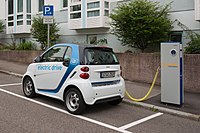Plug-in electric vehicles in Hawaii

As of June 2023[update], there were about 26,000 electric vehicles registered in Hawaii.[1] The state has the second-highest number of electric vehicles per capita in the United States, behind California.[2]
Government policy
[edit]In January 2011, the state implemented a purchase rebate program of up to US$4,500 available for both the purchase of a plug-in electric car purchase, and up to US$5,000 for the purchase of both an electric vehicle and a charging station.[3] The program ended in May 2012 as high consumer demand depleted the fund; more than 450 rebates were issued, totaling about US$2 million. Several efforts to add more funds were unsuccessful.[4]
In June 2021, Governor David Ige signed three bills relating to electric vehicles into law, that do the following:[5]
- Direct the state government to transition all of its light-duty vehicle fleet to electric by 2035
- Require state agencies that rent vehicles for work trips to prioritize renting electric vehicles
- Restart funding for the state's charging station rebate program
In November 2021, the state started allowing electric vehicles to use high-occupancy vehicle lanes regardless of the number of people in the vehicle.[6]
Charging stations
[edit]As of 2021[update], there are 363 public charging stations in Hawaii.[2]
The Infrastructure Investment and Jobs Act signed into law in November 2021 includes US$2.6 million for charging stations in Hawaii.[7]
As of February 2023[update], the state government offers rebates of $1,300–$4,500 for installations of AC charging stations, and $28,000–$35,000 for installations of DC charging stations.[8]
Public opinion
[edit]A poll conducted in November 2021 by Coltura showed 66% of voters in Hawaii supporting a complete transition to electric vehicles in the state by 2030.[9]
References
[edit]- ^ Rodriguez, Max (July 31, 2023). "More electric car chargers needed to meet demand". KHON-TV. Retrieved October 30, 2023.
- ^ a b Solina, Samie (November 17, 2021). "Electric vehicles are all over Hawaii roads. So why aren't there more charging stations?". Hawaii News Now. Retrieved March 17, 2022.
- ^ "Hawaii's Electric Vehicle (EV) Rebate Program". Retrieved August 16, 2010.
- ^ Yonan, Alan Jr. (May 18, 2012). "State runs short of funds for EV rebate". Honolulu Star-Advertiser. Retrieved September 20, 2014. (subscription required)
- ^ McInnis, Brian (June 24, 2021). "Ige signs into law three electric vehicle promotion bills". Pacific Business News. Retrieved March 17, 2022.
- ^ Wu, Nina (November 9, 2021). "Hawaii law amended to allow electric vehicles to use HOV lanes regardless of passenger count". Honolulu Star-Advertiser. Retrieved March 17, 2022.
- ^ "Power up: Millions Coming to Hawaiʻi For Electric Vehicle Charging Stations". Big Island Now. February 10, 2022. Retrieved March 17, 2022.
- ^ "Hawaiʻi Energy launches state's incentive program for electric vehicle charging stations". Big Island Now. February 3, 2023. Retrieved February 18, 2023.
- ^ "Hawaii Voters Support Full Transition to Electric Vehicles by 2030". Coltura. November 16, 2021. Retrieved March 17, 2022 – via PR Newswire.


